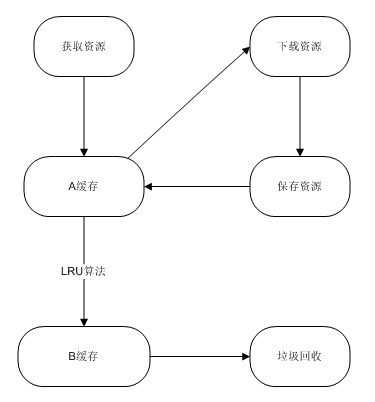編輯:高級開發
另外一個問題就是加載速度,如果應用中圖片加載速度很慢的話,那麼用戶同樣會等到崩潰。
那麼如何處理好圖片資源的獲取和管理呢?
異步下載
本地緩存
異步下載
大家都知道,在android應用中UI線程5秒沒響應的話就會拋出無響應異常,對於遠程獲取大的資源來說,這種異常還是很容易就會拋出來的,那麼怎麼避免這種問題的產生。在android中提供兩種方法來做這件事情:
啟動一個新的線程來獲取資源,完成後通過Handler機制發送消息,並在UI線程中處理消息,從而達到在異步線程中獲取圖片,然後通過Handler Message來更新UI線程的過程。
使用android中提供的AsyncTask來完成。
具體的做法這裡就不介紹了,查下API就可以了,或者是google、baidu下。這裡主要來說本地緩存。
本地緩存
對於圖片資源來說,你不可能讓應用每次獲取的時候都重新到遠程去下載(ListVIEw),這樣會浪費資源,但是你又不能讓所有圖片資源都放到內存中去(雖然這樣加載會比較快),因為圖片資源往往會占用很大的內存空間,容易導致OOM。那麼如果下載下來的圖片保存到SDCard中,下次直接從SDCard上去獲取呢?這也是一種做法,我看了下,還是有不少應用采用這種方式的。采用LRU等一些算法可以保證sdcard被占用的空間只有一小部分,這樣既保證了圖片的加載、節省了流量、又使SDCard的空間只占用了一小部分。另外一種做法是資源直接保存在內存中,然後設置過期時間和LRU規則。
sdcard保存:
在sdcard上開辟一定的空間,需要先判斷sdcard上剩余空間是否足夠,如果足夠的話就可以開辟一些空間,比如10M
當需要獲取圖片時,就先從sdcard上的目錄中去找,如果找到的話,使用該圖片,並更新圖片最後被使用的時間。如果找不到,通過URL去download
去服務器端下載圖片,如果下載成功了,放入到sdcard上,並使用,如果失敗了,應該有重試機制。比如3次。
下載成功後保存到sdcard上,需要先判斷10M空間是否已經用完,如果沒有用完就保存,如果空間不足就根據LRU規則刪除一些最近沒有被用戶的資源。
關鍵代碼:
保存圖片到SD卡上
- private void saveBmpToSd(Bitmap bm, Stringurl) {
- if (bm == null) {
- Log.w(TAG, " trying to savenull bitmap");
- return;
- }
- //判斷sdcard上的空間
- if (FREE_SD_SPACE_NEEDED_TO_CACHE >freeSpaceOnSd()) {
- Log.w(TAG, "Low free space onsd, do not cache");
- return;
- }
- String filename =convertUrlToFileName(url);
- String dir = getDirectory(filename);
- File file = new File(dir +"/" + filename);
- try {
- file.createNewFile();
- OutputStream outStream = newFileOutputStream(file);
- bm.compress(Bitmap.CompressFormat.JPEG, 100, outStream);
- outStream.flush();
- outStream.close();
- Log.i(TAG, "Image saved tosd");
- } catch (FileNotFoundException e) {
- Log.w(TAG,"FileNotFoundException");
- } catch (IOException e) {
- Log.w(TAG,"IOException");
- }
- }
計算sdcard上的空間:
- /**
- * 計算sdcard上的剩余空間
- * @return
- */
- private int freeSpaceOnSd() {
- StatFs stat = newStatFs(Environment.getExternalStorageDirectory() .getPath());
- double sdFreeMB = ((double)stat.getAvailableBlocks() * (double) stat.getBlockSize()) / MB;
- return (int) sdFreeMB;
- }
修改文件的最後修改時間
- /**
- * 修改文件的最後修改時間
- * @param dir
- * @param fileName
- */
- private void updateFileTime(String dir,String fileName) {
- File file = new File(dir,fileName);
- long newModifIEdTime =System.currentTimeMillis();
- file.setLastModified(newModifIEdTime);
- }
本地緩存優化
- /**
- *計算存儲目錄下的文件大小,當文件總大小大於規定的CACHE_SIZE或者sdcard剩余空間小於FREE_SD_SPACE_NEEDED_TO_CACHE的規定
- * 那麼刪除40%最近沒有被使用的文件
- * @param dirPath
- * @param filename
- */
- private void removeCache(String dirPath) {
- File dir = new File(dirPath);
- File[] files = dir.listFiles();
- if (files == null) {
- return;
- }
- int dirSize = 0;
- for (int i = 0; i < files.length;i++) {
- if(files[i].getName().contains(WHOLESALE_CONV)) {
- dirSize += files[i].length();
- }
- }
- if (dirSize > CACHE_SIZE * MB ||FREE_SD_SPACE_NEEDED_TO_CACHE > freeSpaceOnSd()) {
- int removeFactor = (int) ((0.4 *files.length) + 1);
- Arrays.sort(files, newFileLastModifSort());
- Log.i(TAG, "Clear some expiredcache files ");
- for (int i = 0; i <removeFactor; i++) {
- if(files[i].getName().contains(WHOLESALE_CONV)) {
- files[i].delete();
- }
- }
- }
- }
- /**
- * 刪除過期文件
- * @param dirPath
- * @param filename
- */
- private void removeExpiredCache(StringdirPath, String filename) {
- File file = new File(dirPath,filename);
- if (System.currentTimeMillis() -file.lastModifIEd() > mTimeDiff) {
- Log.i(TAG, "Clear some expiredcache files ");
- file.delete();
- }
- }
文件使用時間排序
- /**
- * TODO 根據文件的最後修改時間進行排序 *
- */
- classFileLastModifSort implements Comparator<File>{
- public int compare(File arg0, File arg1) {
- if (arg0.lastModifIEd() >arg1.lastModifIEd()) {
- return 1;
- } else if (arg0.lastModified() ==arg1.lastModifIEd()) {
- return 0;
- } else {
- return -1;
- }
- }
- }
內存保存:
在內存中保存的話,只能保存一定的量,而不能一直往裡面放,需要設置數據的過期時間、LRU等算法。這裡有一個方法是把常用的數據放到一個緩存中(A),不常用的放到另外一個緩存中(B)。當要獲取數據時先從A中去獲取,如果A中不存在那麼再去B中獲取。B中的數據主要是A中LRU出來的數據,這裡的內存回收主要針對B內存,從而保持A中的數據可以有效的被命中。

先定義A緩存:
- private final HashMap<String, Bitmap>mHardBitmapCache = new LinkedHashMap<String, Bitmap>(HARD_CACHE_CAPACITY/ 2, 0.75f, true) {
- @Override
- protected booleanremoveEldestEntry(LinkedHashMap.Entry<String, Bitmap> eldest) {
- if (size() >HARD_CACHE_CAPACITY) {
- //當map的size大於30時,把最近不常用的key放到mSoftBitmapCache中,從而保證mHardBitmapCache的效率
- mSoftBitmapCache.put(eldest.getKey(), newSoftReference<Bitmap>(eldest.getValue()));
- return true;
- } else
- return false;
- }
- };
再定於B緩存:
- /**
- *當mHardBitmapCache的key大於30的時候,會根據LRU算法把最近沒有被使用的key放入到這個緩存中。
- *Bitmap使用了SoftReference,當內存空間不足時,此cache中的bitmap會被垃圾回收掉
- */
- private final staticConcurrentHashMap<String, SoftReference<Bitmap>> mSoftBitmapCache =new ConcurrentHashMap<String,SoftReference<Bitmap>>(HARD_CACHE_CAPACITY / 2);
從緩存中獲取數據:
- /**
- * 從緩存中獲取圖片
- */
- private Bitmap getBitmapFromCache(Stringurl) {
- // 先從mHardBitmapCache緩存中獲取
- synchronized (mHardBitmapCache) {
- final Bitmap bitmap =mHardBitmapCache.get(url);
- if (bitmap != null) {
- //如果找到的話,把元素移到linkedhashmap的最前面,從而保證在LRU算法中是最後被刪除
- mHardBitmapCache.remove(url);
- mHardBitmapCache.put(url,bitmap);
- return bitmap;
- }
- }
- //如果mHardBitmapCache中找不到,到mSoftBitmapCache中找
- SoftReference<Bitmap>bitmapReference = mSoftBitmapCache.get(url);
- if (bitmapReference != null) {
- final Bitmap bitmap =bitmapReference.get();
- if (bitmap != null) {
- return bitmap;
- } else {
- mSoftBitmapCache.remove(url);
- }
- }
- return null;
- }
如果緩存中不存在,那麼就只能去服務器端去下載:
- /**
- * 異步下載圖片
- */
- class ImageDownloaderTask extendsAsyncTask<String, Void, Bitmap> {
- private static final int IO_BUFFER_SIZE= 4 * 1024;
- private String url;
- private finalWeakReference<ImageVIEw> imageVIEwReference;
- public ImageDownloaderTask(ImageViewimageVIEw) {
- imageVIEwReference = newWeakReference<ImageVIEw>(imageVIEw);
- }
- @Override
- protected BitmapdoInBackground(String... params) {
- final androidHttpClIEnt clIEnt =androidHttpClIEnt.newInstance("android");
- url = params[0];
- final HttpGet getRequest = newHttpGet(url);
- try {
- HttpResponse response =clIEnt.execute(getRequest);
- final int statusCode =response.getStatusLine().getStatusCode();
- if (statusCode !=HttpStatus.SC_OK) {
- Log.w(TAG, "從" +url + "中下載圖片時出錯!,錯誤碼:" + statusCode);
- return null;
- }
- final HttpEntity entity =response.getEntity();
- if (entity != null) {
- InputStream inputStream =null;
- OutputStream outputStream =null;
- try {
- inputStream =entity.getContent();
- finalByteArrayOutputStream dataStream = new ByteArrayOutputStream();
- outputStream = newBufferedOutputStream(dataStream, IO_BUFFER_SIZE);
- copy(inputStream,outputStream);
- outputStream.flush();
- final byte[] data =dataStream.toByteArray();
- final Bitmap bitmap =BitmapFactory.decodeByteArray(data, 0, data.length);
- return bitmap;
- } finally {
- if (inputStream !=null) {
- inputStream.close();
- }
- if (outputStream !=null) {
- outputStream.close();
- }
- entity.consumeContent();
- }
- }
- } catch (IOException e) {
- getRequest.abort();
- Log.w(TAG, "I/O errorwhile retrIEving bitmap from " + url, e);
- } catch (IllegalStateException e) {
- getRequest.abort();
- Log.w(TAG, "Incorrect URL:" + url);
- } catch (Exception e) {
- getRequest.abort();
- Log.w(TAG, "Error whileretrIEving bitmap from " + url, e);
- } finally {
- if (clIEnt != null) {
- clIEnt.close();
- }
- }
- return null;
- }
這是兩種做法,還有一些應用在下載的時候使用了線程池和消息隊列MQ,對於圖片下載的效率要更好一些。有興趣的同學可以看下。
總結
對於遠程圖片等相對比較大的資源一定要在異步線程中去獲取本地做緩存
 漫談Android設備選項
漫談Android設備選項
現在您已經了解了傳感器子系統,接下來的部分將回顧一個在 android 手機上錄制音頻的代碼樣例,該樣例運行在 android設備上,onAccuracyChanged
 盤點國內Android移動廣告平台的現狀
盤點國內Android移動廣告平台的現狀
不久前51CTO對國內的移動廣告平台進行一個詳細的介紹,對哇棒(wooboo)、架勢(casee)、有米(youmi)、微雲各平台的優劣都做了評估。本文將對各個平台做一
 述說強大的Android手機平台發展史
述說強大的Android手機平台發展史
android手機平台強大之處還有許多,在這裡我們先涉及一些android操作系統的基本特性,許多的功能在在咱們國內是不可能實現了,不過目前已經支持中文的語音搜索還是看
 Eclipse開發Android應用程序入門(7)
Eclipse開發Android應用程序入門(7)
SDK and AVD Manager 對話框內的New 按鈕.為你的AVD鍵入如下的設置:1234Name: android_1.6Target: Google AP